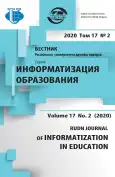Проектирование системы управления обучением на основе метода управления проектами
- Авторы: Заславская О.Ю.1, Симонян А.В.1
-
Учреждения:
- Московский городской педагогический университет
- Выпуск: Том 17, № 2 (2020)
- Страницы: 107-122
- Раздел: ИННОВАЦИОННЫЕ ПЕДАГОГИЧЕСКИЕ ТЕХНОЛОГИИ В ОБРАЗОВАНИИ
- URL: https://journal-vniispk.ru/2312-8631/article/view/321241
- DOI: https://doi.org/10.22363/2312-8631-2020-17-2-107-122
- ID: 321241
Цитировать
Полный текст
Аннотация
Проблема и цель. В статье рассмотрены исследования о сравнении различных систем управления обучением с открытым исходным кодом в дистанционном образовании и управлении образовательным процессом. При всем многообразии систем управления образованием достаточно сложным остается выбор оптимальной модели. Встраивание электронной системы управления образованием в глобальный процесс управления и обучения в системе высшего профессионального образования означает переориентацию образовательного процесса на современные потребности в эффективном использовании информационных и телекоммуникационных технологий. Актуальность статьи определяется неотложностью перехода к активному и повсеместному использованию информационных и телекоммуникационных технологий в управлении процессом образования; неоднозначностью способов и степени интеграции электронных систем управления образованием в реальный процесс управления педагогическим вузом; дискуссионностью выбора модели системы управления образованием и необходимостью научного обоснования оптимальной стратегии разработки особым образом спроектированной системы управления образовательным процессом. Проблема определяется необходимостью проведения отбора такой системы управления, формирования пошагового руководства по выбору системы управления, составления индивидуального списка функций, которые согласуются с приоритетами обучения и задачами университета. Цели статьи заключаются в описании подходов к разработке форм организации процесса обучения, определении возможностей реализации новых способов управления образовательным процессом. Методология. Методологической основой послужил анализ значимости и развития систем дистанционного образования в отечественной педагогике. В работах ученых (А.А. Андреева, В.Ф. Горнева, Ю.П. Господарика, В.И. Кинелева, В.П. Колмогорова, В.Н. Лазарева, А.В. Могилева, В.И. Овсянникова, О.П. Околелова, Е.С. Полат, А.Е. Петрова, В.И. Солдаткина, Э.Г. Скибицкого, В.П. Тихомирова, О.Б. Тыщенко, А.В. Хуторского, В.Д. Шадрикова, В.А. Шаповалова) достаточно подробно рассмотрен обширный диапазон представлений о сущности и содержании дистанционного образования, особенностях учебного процесса, специфике управления и организации такого процесса. Результаты. Обоснована целесообразность применения электронной системы управления в системе управления университета, а также предложена технология проектирования и использования дополнительных модулей с учетом целевых установок университета и построения на этой основе модуля «Электронный деканат». Выявлены принципы и условия организации процесса управления в образовательной организации, рассмотрен метод управления проектами как основа для проектирования модели управления образовательным процессом с использованием информационных и телекоммуникационных технологий. Заключение. Результаты позволили сделать вывод, что информатизация образования становится приоритетным направлением развития всех образовательных организаций. Введение системы электронного документооборота позволит сэкономить огромную часть рабочего времени преподавателей, а новый подход к составлению курсов - существенно улучшить содержание современного образования. Предложенная модель внедрения информационных технологий позволяет ускорить сбор, обработку большого объема информации, оптимизировать время и средства, расходуемые на принятие решения, повысить качество принимаемых управленческих решений за счет предоставление актуальной, достоверной информации. При отборе информационных и программных комплексов важно правильно определить к ним требования, критерии, а также функции, обязанности, задачи сотрудников, для которых они должны предназначаться.
Об авторах
Ольга Юрьевна Заславская
Московский городской педагогический университет
Автор, ответственный за переписку.
Email: zaslavskaya@mgpu.ru
доктор педагогических наук, профессор, профессор кафедры информатизации образования
Российская Федерация, 129226, Москва, 2-й Сельскохозяйственный проезд, д. 4, корп. 1Анжелика Владимировна Симонян
Московский городской педагогический университет
Email: SimonyanA@mgpu.ru
начальник организационного отдела Управления учебно-методической работы
Российская Федерация, 129226, Москва, 2-й Сельскохозяйственный проезд, д. 4, корп. 1Список литературы
- Agafonov SV, Dzhaliashvili ZO, Krechman DL. Sredstva distancionnogo obucheniya. Metodika, tekhnologiya, instrumentarij [Means of distance learning. Methodology, technology, tools]. Saint Petersburg: BHV-Peterburg Publ.; 2003.
- Anisimov AM. Rabota v sisteme distancionnogo obucheniya “Moodle” [Work in system of remote training “Moodle”]: textbook. Har'kov: HNAGH Publ.; 2009.
- Antonova SG, Tyurina LG. Sovremennaya uchebnaya kniga [Modern educational book]. Moscow; 2001.
- Verbickij AA. Aktivnoe obuchenie v vysshej shkole: kontekstnyj podhod [Active learning in higher education: contextual approach]. Moscow; 2001.
- Gejn AG, Senokosov AI, Sholohovich VF. Informatika. 7–9 klassy [Informatics. 7–9 classes]. Moscow: Drofa Publ.; 2000.
- Gerasimova O. Mobil'noe obuchenie [Mobile training]. Available from: http://www. trainings.ru/library/articles/?id=6321 (accessed: 02.11.2019).
- Grinshkun VV, Zaslavskaya OYu. Istoriya i perspektivy razvitiya programm informatizacii obrazovaniya [History and prospects of development of programs of Informatization of education]. Vestnik Moskovskogo gorodskogo pedagogicheskogo universiteta. Serija: Informatika i informatizacija obrazovanija [Bulletin of the Moscow City Pedagogical University. Series: Informatics and Informatization of Education]. 2011;1(21):5–13.
- Zaslavskaya OYu. Informatizaciya obrazovaniya: novoe ponimanie mesta i roli uchitelya v uchebnom processe [Informatization of education: a new understanding of the place and role of teachers in the educational process]. Vestnik Moskovskogo gorodskogo pedago- gicheskogo universiteta. Serija: Informatika i informatizacija obrazovanija [Bulletin of the Moscow City Pedagogical University. Series: Informatics and Informatization of Education]. 2007;2(9):81–82.
- Zagvyazinskij VI. Teoriya obucheniya: sovremennaya interpretaciya [Theory of learning: modern interpretation]. Moscow: Akademiya Publ.; 2006.
- Zagidullin RR, Zoriktuev VC. Konceptual'nye voprosy distancionnogo obrazovaniya [Conceptual issues of distance education]. Informacionnye tekhnologii [Information technologies]. 1997;(5):33–36.
- Nazarova TS, Tihomirova KM, Kudina IYu, Kozhevnikov DN, Aver'yanov YuI et al. Instrumental'naya didaktika: perspektivnye sredstva, sredy, tekhnologii obucheniya [Instrumental didactics: promising tools, environments, learning technologies]. Moscow – Saint Petersburg; 2012.
- Knyazeva MD, Trapeznikov SN. Sistema distancionnogo obucheniya [Distance learning system]. Moscow; 2001.
- Konovalova OV. Klassifikaciya didakticheskih igr kak teoreticheskaya osnova ih vybora i prakticheskogo primeneniya [Classification of didactic games as a theoretical basis for their selection and practical application]. Pedagogika: tradicii i innovacii [Pedagogy: traditions and innovations]: materials of the 5th International Scientific Conference (p. 35–36). Chelyabinsk: Dva komsomol'ca Publ.; 2014.
- Levchenko IV. Pedagogicheskaya praktika po informatike [Pedagogical practice in informatics]: program and guidelines. Moscow: MGPU Publ.; 2001.
- Okolesov OP. Sistemnyj podhod k postroeniyu elektronnogo kursa dlya distancionnogo obucheniya [System approach to the construction of an electronic course for distance learning]. Pedagogika [Pedagogy]. 1999;(6):50–56.
- Orchakov OA, Kalmykov AA. Proektirovanie distancionnyh kursov [Design of distance courses]: textbook. Moscow: MNEPU Publ.; 2002.
- Polat ES, Petrova AE. Distancionnoe obuchenie: kakim emu byt'? [Distance learning: what should it be?]. Pedagogika [Pedagogy]. 1999;(7):29–34.
- Zaslavskaya OYu, Zaslavskiy AA, Bolnokin VE, Kravets OJa. Features of Ensuring Information Security when Using Cloud Technologies in Educational Institutions. International Journal on Information Technologies and Security. 2018;10(3):93–102.
Дополнительные файлы









